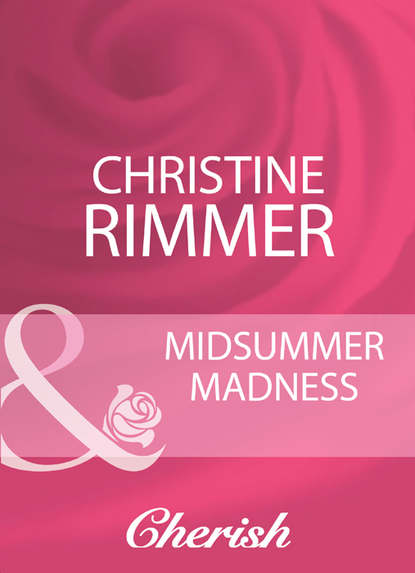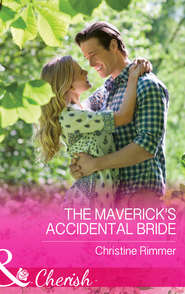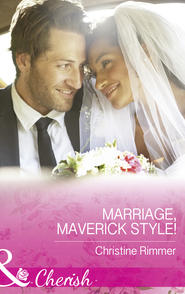По всем вопросам обращайтесь на: info@litportal.ru
(©) 2003-2024.
✖
Midsummer Madness
Автор
Год написания книги
2018
Настройки чтения
Размер шрифта
Высота строк
Поля
“I can speak up,” she said aloud, “if I force myself. I’ve been working on that.”
Cody, for his part, was studying her, puzzled why shy Julie would even consider taking on such a task, let alone insist on it. Then it came to him how to settle this problem once and for all.
He lowered his dangling foot to the floor and stood up. “All right, then,” he said, seeming to give in to her.
She blinked. “You agree? You’ll let me handle it?”
“It’s not my decision.”
“What do you mean?”
“I mean—” he shrugged “—that you can talk to the merchants’ association at seven tonight.” The words were offhand, though he knew they’d have a crushing effect. Julie would never get up in front of a group of people and give a speech. Now she would have no choice but to back down.
Cody began a casual circuit of his desk, not looking at her anymore. There was dead silence from Juliet’s corner of the room. He was positive she’d be wearing that stricken look she got when anyone even suggested she do something that might draw attention to herself. He’d always hated to see that look on her face, because he knew it meant she was suffering agonies of shyness.
However, a little suffering now was preferable to her getting too carried away with this crazy idea that she could take over Midsummer Madness for that damned delinquent expert from Hollywood.
Cody continued in an offhand tone. “You can impress them all with what a great idea it would be to hire you. I mean, you might as well start forcing yourself to speak up right away, don’t you think?”
Cody reached his leather chair and plunked himself down in it. He allowed a benign smile, confident that he’d handled this little predicament just right. Faced with the prospect of getting up in front of all those people, shy Julie would run the other way quicker than a cat with its tail on fire.
He looked directly at her again, steeling himself for the agony he’d see on her face, and for the defeated expression that would come next. It took him several seconds to absorb what he actually saw.
Her chin was set, her lips pressed together. She looked—by God, she looked determined. When she spoke, Cody couldn’t believe his ears.
“All right,” she said. “I’ll speak to the merchants’ association at seven tonight.”
Two
“And, as for the Midsummer Madness Revue,” Juliet announced in a calm, clear voice, “well, I just think we can have a lot of fun with it this year. We’ll have music by the Barbershop Boys and the school choirs, as always. And I also think maybe I could line up a few of our local favorites to give us a number or two. There’ll be poems by Flat-nosed Jake.” Juliet winked at Jake, a bearded, scruffy character in the front row, whose nose appeared to have collided with something unyielding at some point in his life. “Jake, as most of you know, is poet emeritus of our fair city. And we’ll include a skit detailing the settlement of Emerald Gap by a group of prospectors back in 1852. Also, Melda Cooks has written a reenactment of the hanging of Maria Elena Roderica Perez Smith, who, as you might recall, was a local laundress lynched here after she stabbed a man to death in a brawl in the spring of 1856….”
At the back of Emerald Gap Auditorium, where the bright spill of light that shone on Juliet’s pale hair did not reach, Cody sat in one of the creaky old theater seats and wondered what the hell was going on.
What had happened to shy Julie Huddleston?
This afternoon, no sooner had she knocked his boots off by saying she’d speak before the merchants’ association, than she’d demanded all the planning materials he’d been saving to give to the pro from Hollywood. With the big folder tucked safely under her arm, she’d taken right off for her own small office two blocks away.
She must have gotten right on the phone, because all the people she was claiming were going to help her out were sitting down front now, nodding and smiling and looking like they were willing to follow her off the nearest cliff if she asked them to.
And why the hell not? Her start had been a little rocky—that much was true. She’d had that freaky spooked rabbit look for just a minute there when she got behind that podium and realized all those faces were staring at her. But she’d recovered—boy, had she. She’d recovered just fine.
Up on the stage, Juliet continued. “And, since this is gold country after all, I think the ball on Saturday, the third, should be a genuinely gala event. This year we’ll really put some effort into making it a true costume affair, talk as many locals as possible into dressing in the period….”
Back in the darkness, Cody shook his head. On the one hand, he was experiencing a massive feeling of relief because it looked like the association was going to hire Julie to do the job. Cody was going to be let off the hook for it.
On the other hand, though, he felt a kind of creeping disquiet. He looked at Julie up there in the light, and he wondered if he knew her at all.
Which was crazy. He’d known her practically all his life. They were the same age and had gone through school together.
Cody smiled to himself, remembering Julie on the first day of kindergarten. The teacher, Miss Oakleaf, had called the roll. And Julie had been too scared to say her name. She’d stared down at her lap, her white skin flushing painful red, her little hands shaking.
In his memory, Julie had always been like that—afraid of her own shadow, keeping to herself, quivering visibly at any notice paid to her. He’d been a little surprised that she got through state college, wondered how she’d survived the crowds. But she’d done it, and she’d returned to Emerald Gap to set up her own business, with herself as her only employee. He’d hired her right off, and so had half of the other merchants and small businessmen in town. She was doing well, but always in that quiet, retiring way that she had. At least until recently.
Cody made a low sound in his throat, as it occurred to him that for the past few weeks Julie had been driving around in a red sports car. He’d seen the red car, on a morning when he’d gone out to do the chores, parked in front of the guesthouse at his ranch. Her little brown economy car had been nowhere in sight.
And that was another thing. Three months ago, he’d decided to rent out the guesthouse. Julie had taken it. It had never crossed his mind to question why she would suddenly decide to move out of the big house in town that her parents had left to her when they retired, and into a two-bedroom cottage fifteen miles from most of her clients; he’d simply been glad to get someone dependable so easily. But now he wondered….
Not that he was likely, the way things were, to find out much. They lived less than three hundred yards from each other, yet it might as well be three hundred miles; they each maintained strict privacy.
Up on the stage, Julie laughed. It was a shy little laugh, but a charming one. Her pale hair, which was straight and hung to her shoulders, had a smooth, curried sheen in the flood of light from above.
Cody shifted in the seat, trying to accommodate his long legs more comfortably without doing what he longed to do—swing his boots up on the row in front of him. Andrea Oakleaf, still very much a schoolteacher, was down in the second row. If she turned and saw him with his boots up, he’d be hearing about it in no uncertain terms.
Juliet made a mild joke. A ripple of laughter passed through the hall.
She was definitely changing, Cody thought. His efficient yet touchingly bashful bookkeeper wasn’t so bashful anymore. What could have made her decide to step out of the shadows after all these years?
Maybe, he thought, he should ask her out to dinner sometime and find out. After all, they were friends, weren’t they? There couldn’t be any harm in spending an evening or two enjoying each other’s company. They could laugh over old times together and really get to know each other—
Cody straightened up and cut off the rambling thought.
What the hell was going on here? He’d been wondering what was happening with Julie. Maybe a better question would be, what was happening with him? Why the big interest in a woman who’d been around since they were both in diapers?
Cody decided not to think about that. It was no big deal. He’d put thoughts of Julie—and thoughts about why he was thinking so much about Julie—right out of his mind.
That decided, he focused on the stage again—and saw Julie.
All at once, unable to sit still, he swung his boots up on the back of the chair in front of him, recalled Miss Oakleaf, and swung them back down again. They hit the old pine strip floor a mite too firmly, and Andrea Oakleaf turned briefly around to shoot one of her famous squinty-eyed looks toward the darkness where he sat. After that, Cody kept his feet on the floor and his mind, more or less, in control.
Up on the stage, Juliet finished her speech. She left the podium to the accompaniment of approving applause. She sat, feeling as if she floated there, on a folding chair to the left of the podium, while questions were asked of her. She had answers to all of them.
It was incredible.
Melda Cooks asked how Juliet would handle casting the play she’d written. Juliet remembered past years, when they’d had tryouts, and no one had shown up. Or when they’d cast by asking around, and some people had felt left out.
So Juliet said she’d combine the two methods: a day of tryouts, and then any uncast roles would be filled by appealing to the community consciousness of people who might fit the parts. Juliet raised her eyebrows just a fraction when she said “community consciousness,” and everyone chuckled a little. They all knew what she meant; they’d end up begging a few softhearted souls to get involved.
Babe Allen pointedly remarked that Juliet could hardly expect to be paid what they’d agreed to pay the expert from Hollywood. Juliet, prepared for that one, smiled sweetly and answered that she was willing to do the work as a community service—provided the merchants donated the full fee they would have paid to the new community park down at the foot of Commercial Street.
It was so…marvelously simple. And fun. She just used her head, and then explained what she’d figured out, and it made sense. People listened. Amazing. Wonderful.
After they took the vote and elected her, Juliet approached the podium again to murmur a brief thank-you and to ask her committee heads—whom she’d lined up just this afternoon—to confer with her briefly in the lobby after the meeting was over. Then she gathered up her materials and left the stage through the wings, floating out the stage door, and then circling around to wait for the others in the quiet lobby out front.
Within a half hour, all her people were assembled. Jake, who was not only a poet but also worked part-time on the Emerald Gap Bulletin, agreed to get right on the posters and newspaper notice for the revue tryouts, which would be held on Monday evening. Reva Reid, parade committee chairman, would make the rounds tomorrow to firm up the list of all the floats and themes. The frog jump and Race Day chairpeople respectively agreed that they’d have each event fully planned by Tuesday evening, when the pageant committee would meet once again. Andrea Oakleaf volunteered to check with the Pine Grove Park Commission about the permit for the big closing-day picnic. And Burt Pandley promised to find, by next Friday, at least twelve more participants for the Crafts and Industry Fair, which was slated to run upstairs in the town hall the whole ten days of the festival.
It was after nine when Juliet finally left the lobby of the old auditorium. Outside, the night was balmy and moonless, the air very still. She stood for a moment beyond the big entry doors, between a pair of Victorian gas street lamps, and shivered just a little with excitement and triumph. She drew a deep breath and thought she could smell the pines and firs that cloaked the surrounding foothills.
How beautiful Broad Street looked, clothed in night, with its brick-fronted buildings, and the old-fashioned gas lamps all along the street. On the corner diagonally across from her, she could see the lights in the window of Cody’s restaurant.











